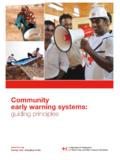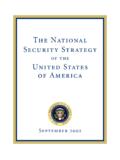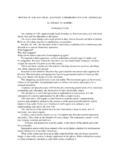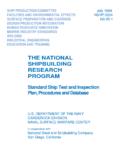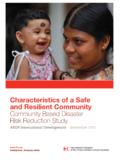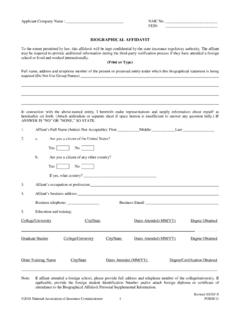Transcription of Social media guidelines for IFRC staff
1 Social media guidelines for IFRC staff 2. International Federation of Red Cross and Red Crescent societies guidelines / Social media for IFRC staff Introduction Communities have the power to make the world a better place. We know this, because we see it happen every day through the work of the volunteers in our 186 National societies . The International Federation of Red Cross and Red Crescent societies (IFRC) embraces the fact that today's communities do not only exist in the physical world, but also online. The IFRC leadership recognizes the wide reach that communication in online communities can have - both positively and negatively. It encourages all staff members to use new and Social media responsibly to communicate about topics within their areas of expertise, as long as this doesn't interfere with their primary duties or the security of the IT systems. While communication on behalf of the organization is the primary re- sponsibility of the communications department, the senior manage- ment team recognizes that other staff members can also further the organization's goals by using Social media networks.
2 These guidelines are designed to provide helpful, practical advice and also to protect the IFRC, secretariat staff and Red Cross Red Crescent staff worldwide. If you have any questions, please don't hesitate to contact the external communications unit in Geneva Who these guidelines are for If you are using Social media tools such as Facebook, Twitter, Flickr or YouTube, if you have your own blog or if you are posting comments on other people's blogs, then these guidelines are for you. If you would like to know more about Social media in general and what dif- ferent tools exist, please take a look at the Social media toolkit on FedNet. This 36-page document contains a lot of valuable and practical tips. Why "personal" and "private". are not the same While communication through Social media networks is primarily a personal matter, this is not the same as it being private. In a lot of cas- es, written conversations inside these networks can be found through search engines such as Google.
3 Even in cases where only your contacts can see what you write, there is a possibility that one of them will for- ward what you say and make it visible to a wider audience. As a result, personal conversation within Social media networks should be consid- ered public rather than private. 3. International Federation of Red Cross and Red Crescent societies guidelines / Social media for IFRC staff guidelines These guidelines consist of two parts: first, best practice and recom- mendations by the communications department. This is followed by a summary of the rules and obligations that are already in place and how they apply to staff use of Social media . Best practice 1) Be a good ambassador While it is everyone's personal decision whether to use Social media networks and tools or not, you should always be aware that your be- haviour and opinions reflect on the organization. 2) Get advice If your unit, programme or department wants to use Social media to promote IFRC activities, please contact the external communications unit in Geneva which has the lead on Social media activities for the secretariat and can ensure consistency and help with best practice.
4 3) Be passionate Passion is contagious. Share the passion you feel for your work and talk about the successes you have been part of. 4) Use a disclaimer If you have a blog and talk about work-related issues, add a disclaimer to each page making clear that the views you express are yours alone. Be aware that this disclaimer doesn't free you from the obligations you have under the Codes of Conduct or the Fundamental principles. Example: "The postings on this site are my own and don't neces- sarily represent positions, strategies or opinions of my employer.". If you have an about me page, we advise against using photos where you stand in front of one of the emblems since this might give the web site or blog an official appearance. 5) Think of CNN, your mother and your boss Don't say anything online that you wouldn't be comfortable seeing quoted on CNN, being asked about by your mother or having to justify to your boss.
5 6) Add value The IFRC believes that sharing of information and experiences benefits the whole humanitarian community and ultimately the beneficiaries we serve. Feel free to share and discuss your experiences in vac- 4. International Federation of Red Cross and Red Crescent societies guidelines / Social media for IFRC staff cination campaigns, field communication, building of transitional shel- ters etc. If IFRC staff is perceived to be knowledgeable and helpful this will reflect positively on you and on the organization. Obviously, use common sense where information is concerned that is internal and/or confidential. If in doubt - ask the owner of the informa- tion you want to share. Refrain from commenting on the work of colleagues in this or other organizations that are outside your field of expertise. 7) Feel free to correct others but stick to the facts The IFRC and the International Red Cross and Red Crescent Move- ment are complicated organizations and we work in complicated legal and operational contexts.
6 People frequently misunderstand or choose to misunderstand us. If you come across a misrepresentation of the Movement, feel free to identify yourself and organizational affiliation and correct their mistake but do so with respect and with facts. If you don't feel comfortable doing it yourself, please contact the exter- nal communications unit in Geneva Example: In early 2009 a newspaper reported incorrectly that a National Society would abolish the cross completely and replace it with the crystal. A number of bloggers then spread this infor- mation through Twitter and other channels. The media unit re- plied with a short message along these lines: "That is not correct. The red crystal is an additional emblem and will not replace the cross or the crescent. States and National societies that currently use and want to keep using the red cross or the red crescent will continue to do so. Please find more information on our web site: ".
7 In most cases people won't mind being corrected and they will fre- quently even distribute the correction themselves. However, if you get the feeling that someone deliberately misinterprets everything you say, just ignore them. 8) Be the first to admit a mistake If you have made a mistake, be upfront about it. Admit and correct the mistake. If you correct an earlier post in a blog do so visibly, by using the strikethrough function and adding a paragraph that explains the update at the end. Example: "Update, 5 July 2009: My team delivered 500 tons of widgets to Alphaville - not 5,000 tons as I wrote previously.". 5. International Federation of Red Cross and Red Crescent societies guidelines / Social media for IFRC staff 9) Use your best judgement If you are about to publish something that makes you even the slight- est bit uncomfortable, let it sit for a few more hours or a day and think again whether this is what you want to say.
8 If it still makes you feel uncomfortable and it is related to the Movement, ask your supervisor for advice. 10) Protect your own privacy A lot of web sites allow you some form of control over who can see your material. Use these features. Example: On Facebook you can control your privacy settings un- der "Settings -> Privacy Settings -> Profile". We recommend that you set all of these settings except for "Profile" and "Basic info". to "Only friends". 11) Keep security in mind Be particularly careful with what you are discussing online if you are in an operational context. Please make sure that you have read and fol- low your delegation's security requirements. Never talk about routes or times of planned convoys or distribution of goods. If in doubt, talk to the security unit or a security delegate. Never post personal details such the home addresses of yourself or colleagues. Bear in mind that personal details of local staff members can be very security sensitive in many operational areas this includes their names and pictures.
9 To guard against burglaries, do not post information on when you are travelling or away from your duty post. 12) Spread the word and connect with your colleagues Don't only talk about yourself but also about the successes of your col- leagues. Connect with them through Social networks and spread their success stories. To get you started, we have included links to the IFRC's most active Social media profiles in the appendix. Existing rules and obligations 1) Observe neutrality Don't get involved with political initiatives. The Code of Conduct for IFRC staff (Rule 14) requires you to: "not publicly express any opinions on events connected with political affairs or engage in political activities that could reflect adversely on the impartiality, neutrality or independence of the Federation, , public support of a political party.". In the context of Social media , it is important to remember that the Code of Conduct applies not only when you represent the IFRC or dur- 6.
10 International Federation of Red Cross and Red Crescent societies guidelines / Social media for IFRC staff ing working hours but around the clock and even when you are on leave. Please keep in mind that the Code of Conduct also applies to "all accompanying family members covered under the Federation's legal status" and that it is your responsibility to ensure that they are follow- ing it. Example: Following the elections in Alphaland, the opposition claims that the results were rigged and start a campaign on Facebook and Twitter. They ask users to modify their profile photo and to post messages in support of re-elections. As an IFRC staff member, you cannot take part in these or other related activities since this would be a violation of the principle of neutrality and the Code of Conduct. In addition to the Code of Conduct for IFRC staff , the Fundamental Prin- ciples, the rules laid out in the Handbook for Delegates, and the Code of Conduct for the International Red Cross and Red Crescent Move- ment and NGOs in Disaster Relief apply as well.

